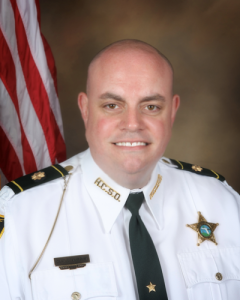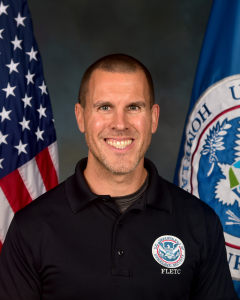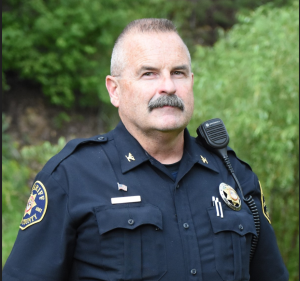THE IMPORTANCE OF ACA ACCREDITATION – MYTHS AND REALITIES
SATURDAY, FEBRUARY 3RD | 8:00AM TO 9:00AM | COMMERCE ROOM
This seminar is a Sheriff’s view of the importance of ACA Accreditation. Three Sheriff’s will discuss the importance and benefits of achieving and maintaining ACA Accreditation in their organization. They will provide examples of how ACA assisted them in operating their jails and responding to critics of their operations. This will assist participants in understanding the importance of ACA Accreditation and why Sheriff’s seek ACA Accreditation, which they can use to share with their staff and people in the community.
PRESENTERS: Sheriff Gary McFadden, Sheriff George Maier, American Correctional Association, Robert Green, Executive Director, American Correctional Association, Deputy Executive Director Jeff Washington, Sheriff Jose Quiroz Jr.
 Sheriff Garry L McFadden is a thirty-seven-year veteran of the Charlotte Mecklenburg Police Department (“CMPD”). Sheriff McFadden is one of the most decorated law enforcement officers in the history of Charlotte Mecklenburg Police Department. He spent thirty years as a detective and twenty-two of those in the homicide unit.
Sheriff Garry L McFadden is a thirty-seven-year veteran of the Charlotte Mecklenburg Police Department (“CMPD”). Sheriff McFadden is one of the most decorated law enforcement officers in the history of Charlotte Mecklenburg Police Department. He spent thirty years as a detective and twenty-two of those in the homicide unit.
After a stellar career, Sheriff McFadden retired from Charlotte Mecklenburg Police Department on July 31, 2011 and was immediately re-hired by the City of Charlotte and assigned to work in the Office of the Chief to the Community Relations Unit to help implement programs within the community.
In 2015 he was named Charlotte’s Citizen of The Year- Mayor’s Office City of Ioo Charlotte
In 2015 while working for Charlotte Mecklenburg Police Department Sheriff McFadden and three local barbers created a community initiative called; Cops & Barbers, the initiative captured the attention of “The President’s Task Force on 21st Century Policing”, and as a result, President Obama invited the group to the White House. President Obama considered this vision as one of the top ten initiative in creating meaningful relationships in communities.
As a detective with the Charlotte Mecklenburg Police Department, Sheriff McFadden has never lost a homicide case during a trial. He has been featured on; American Most Wanted, The First 48 and The Justice Files and a contributor to People magazine and several national media outlets.
On June 14, 2016, Investigative Discovery channel “ID ”presented “I Am Homicide” a docuseries highlighting a few of Sheriff McFadden’s most complex homicide cases as a homicide detective with the Charlotte Mecklenburg Police Department that he worked over the span of three decades. The début of this nationally and international television show allowed Sheriff McFadden to be the first African American Law Enforcement Officer to have his own television show. After completing three seasons his contract ended. But in 2023 ID signed him to another series that will be launched the fall of 2023 called “Good Cop – Bad Cop”
On May 8th, 2018, the voters of Mecklenburg County in North Carolina elected McFadden as their next Sheriff making him the first African American Sheriff in the history of the county.
On December 4th, 2018, Sheriff Garry McFadden became the 45th Sheriff of Mecklenburg County and was re-elected on May17th 2022 for a second term.
In 2020 he was named Omega Psi Phi Fraternity Citizen of the Year by his beloved fraternity.
Since being Elected
Appointed to Several State & National Law Enforcement Boards – Committee
National Sheriff Association
- Board Chairman for the IGNITE Program
- Legal Committee Member
- National Use of Force Committee Member
Major County Sheriff In America
- Regional Representative for 13 States
- Foundation Committee
North Carolina Sheriff Association
- Training Committee
- Legislative Committee
American Correctional Association
- Executive Board Member
- Board of Governors Chairman for Detention Centers
- Performance Based Standards Committee Member
- Behavior Health Committee Member
North Carolina Sentencing and Policy Advisory Committee
- Commissioner
Department of Homeland Security
- Faith Based Security Advisory Council
 George T. Maier has been a Law Enforcement Professional for over 40 years serving as a Trooper with the Ohio State Highway Patrol and locally and throughout the State of Ohio. He is committed to Public Service and enjoys engaging in Community events both as a Community Leader and as a resident citizen of Stark County.
George T. Maier has been a Law Enforcement Professional for over 40 years serving as a Trooper with the Ohio State Highway Patrol and locally and throughout the State of Ohio. He is committed to Public Service and enjoys engaging in Community events both as a Community Leader and as a resident citizen of Stark County.
Sheriff Maier was appointed Stark County Sheriff in 2013 where he has held the elected seat as our Stark County Sheriff for the past 10 years serving Stark County and leading his office to protect and serve his community.
Sheriff Maier is a Washington High School graduate and lives in Massillon with his wife Misty. He has three adult children George II, Johnnie H., and Michael P. Maier, along with 6 grandchildren. He has always been active in the communities where he has been assigned and is extremely proud to call Stark County his home. Also; following in their father’s footsteps, two of Maier’s three sons work in law enforcement.
 The American Correctional Association recently selected Mr. Robert (Rob) Green to serve as their next Executive Director upon the retirement of Mr. James Gondles. Mr. Green brings over 38 years of corrections and government leadership experience to the position. Most recently, Mr. Green served as the Secretary of Corrections for the State of Maryland. Previously he held positions as the Corrections Director for Montgomery County, Maryland and the Sheriff’s Office in Frederick County, Maryland. Mr. Green has served the American Correctional Association for for over 30 years. His most recent committee assignment was as Vice Chair of the Commission on Accreditation for Corrections.
The American Correctional Association recently selected Mr. Robert (Rob) Green to serve as their next Executive Director upon the retirement of Mr. James Gondles. Mr. Green brings over 38 years of corrections and government leadership experience to the position. Most recently, Mr. Green served as the Secretary of Corrections for the State of Maryland. Previously he held positions as the Corrections Director for Montgomery County, Maryland and the Sheriff’s Office in Frederick County, Maryland. Mr. Green has served the American Correctional Association for for over 30 years. His most recent committee assignment was as Vice Chair of the Commission on Accreditation for Corrections.
 Jeffrey Washington has served as Deputy Executive Director for the American Correctional Association since August 1995. Serving under the Executive Director conducting Association business, he is responsible for liaison between the Executive Director and Association staff, and liaison to the press and media. In the absence of the Executive Director, he serves as the Executive Director, attending to Association business and making key decisions relating to the day-to-day operation of the Association and overall operations. He meets with the Executive Committee, with the Executive Director, to set Association goals and objectives and he travels nationwide to promote the Association and national correctional policies. Mr. Washington has served in many positions for the American Correctional Association from 1985- present. Those positions include regional administrator; deputy administrator; administrator; director and deputy executive director.
Jeffrey Washington has served as Deputy Executive Director for the American Correctional Association since August 1995. Serving under the Executive Director conducting Association business, he is responsible for liaison between the Executive Director and Association staff, and liaison to the press and media. In the absence of the Executive Director, he serves as the Executive Director, attending to Association business and making key decisions relating to the day-to-day operation of the Association and overall operations. He meets with the Executive Committee, with the Executive Director, to set Association goals and objectives and he travels nationwide to promote the Association and national correctional policies. Mr. Washington has served in many positions for the American Correctional Association from 1985- present. Those positions include regional administrator; deputy administrator; administrator; director and deputy executive director.
 Jose Quiroz joined the Arlington County Sheriff’s office on September 10, 2001.
Jose Quiroz joined the Arlington County Sheriff’s office on September 10, 2001.
Jose graduated from the Northern Virginia Criminal Justice Academy in 2002 and was assigned to the Corrections Division. Jose worked night shift for several years then transitioned to day shift.
In 2005, Jose was assigned to the Judicial Services Division and worked in the court security section. In 2014, Jose was reassigned to the Records Section. In 2015, Jose was promoted to sergeant. Jose was assigned to all four shifts in the detention facility as a zone supervisor.
In 2018, Jose was assigned to assist as the administrative sergeant to the Assistant Director of Corrections. Later in 2018, Jose was assigned as the training sergeant which was a newly created position in the training section. As the training sergeant Jose was assigned to oversee the Field Training program, supervise newly hired deputy sheriff recruits, and assist with other assignments in the training section.
In 2019, Jose was promoted to the rank of lieutenant and assumed the role of Training Coordinator, overseeing all training related functions for the sheriff’s office. In 2022, Jose was promoted to captain, and assigned to oversee all sheriff’s office contracts to include the medical and food services contracts.
Jose was also a member of the Honor Guard Team from 2005-2020, serving as team commander from 2017-2020.
A native of Arlington County, Jose attended Abingdon Elementary School, Kenmore Middle School, and Swanson Middle School. After graduating from Bishop O’Connell High School in Arlington in 1997, Jose joined the United States Marine Corps and served for four years with an honorable discharge.
Jose loves serving his community and is passionate about connecting the sheriff’s office with the community. In 2018, Jose created the sheriff’s office annual breast cancer awareness campaign which has donated over fifteen thousand dollars to the Virginia Hospital Center Outpatient Clinic.
Jose also served as director of the Arlington 9/11 Memorial 5K event from 2019-2022. Jose oversaw the planning, budget, and execution of the event and worked closely with all four Arlington public safety agencies and
community leaders to put together a successful event. Prior to serving as the director, Jose was a member of the planning committee. Jose still serves as an advisor to the Arlington 9/11 Memorial 5K. The Arlington 9/11 Memorial 5K has raised over eight hundred thousand dollars to date.
Jose is a member of the Virginia Sheriff’s Association, National Sheriff’s Association and American Correctional Association.
Jose lives in Arlington with his wife and two children, and their two dogs. In his time off, Jose enjoys spending time with family and friends and all the diversity that Arlington has to offer.
Pandemic Response in US Jails: Adapting Lessons Learned from COVID-19
SATURDAY, FEBRUARY 3RD | 8:00AM TO 9:00AM | STATE ROOM
During the COVID-19 pandemic, local jails and detention facilities had to improvise to address the risks to their detained population and staff. Join the Bureau of Justice Assistance (BJA) and guests who will present lessons learned from the COVID-19 response in confinement facilities and how those lessons impact facilities’ pandemic response planning.
In the first segment, BJA will present on what worked well, what did not work well, and what opportunities there are for improvements to responding to a similar event in the future. The second segment will feature a case study from the perspective of a local jail on how they navigated the pandemic with great success. In the final segment, the presenters will facilitate a scenario-based interactive activity exploring opportunities for change in responding to a similar event. Attendees will gain insights into how to improve their plans for future infectious disease outbreaks or pandemics.
PRESENTERS: Sara Sullivan, Senior Policy Advisor, Bureau of Justice Assistance, Office of Justice Programs, US Department of Justice, Kim Fletcher, Director, CNA, Major Shaun Klucznik, MA, CJM, Judicial Services Bureau Commander, Hernando County, Florida Sheriff’s Office, Co-Facilitator, BJA CDMCF TTA Confinement Facilities Jails Peer Group
 Sara Sullivan is a Senior Policy Advisor at the U.S. Department of Justice, Bureau of Justice Assistance (BJA). Ms. Sullivan has more than 15 years of experience in the nonprofit and public sectors, with a focus on criminal justice and public health. She has led national, state, and citywide initiatives on complex issues including justice reform, child welfare, public benefits access, housing, and community-based service delivery. She currently leads the BJA COVID-19 Detection and Mitigation in Confinement Facilities (CDMCF) Training and Technical Assistance (TTA) program, which provides TTA to confinement facilities and state, local, and territorial health departments who are recipients of funding from the Centers for Disease Control and Prevention’s Epidemiology and Laboratory Capacity for Prevention and Control of Emerging Infectious Diseases (ELC) cooperative agreement.
Sara Sullivan is a Senior Policy Advisor at the U.S. Department of Justice, Bureau of Justice Assistance (BJA). Ms. Sullivan has more than 15 years of experience in the nonprofit and public sectors, with a focus on criminal justice and public health. She has led national, state, and citywide initiatives on complex issues including justice reform, child welfare, public benefits access, housing, and community-based service delivery. She currently leads the BJA COVID-19 Detection and Mitigation in Confinement Facilities (CDMCF) Training and Technical Assistance (TTA) program, which provides TTA to confinement facilities and state, local, and territorial health departments who are recipients of funding from the Centers for Disease Control and Prevention’s Epidemiology and Laboratory Capacity for Prevention and Control of Emerging Infectious Diseases (ELC) cooperative agreement.
 Kim Loch Fletcher has more than forty years of emergency management response and leadership. She has significant experience in disaster operations, after-action evaluation, and development of lessons learned for major disasters such as COVID-19 and major hurricanes such as Ian and Katrina. Ms. Fletcher served as Deputy of Operations for deployed technical teams assessing processes and procedures at COVID-19 Community Vaccination Centers across the country, and as VP for three corporations, leading and directing programs for emergency management, homeland security consensus, and dispute resolution.
Kim Loch Fletcher has more than forty years of emergency management response and leadership. She has significant experience in disaster operations, after-action evaluation, and development of lessons learned for major disasters such as COVID-19 and major hurricanes such as Ian and Katrina. Ms. Fletcher served as Deputy of Operations for deployed technical teams assessing processes and procedures at COVID-19 Community Vaccination Centers across the country, and as VP for three corporations, leading and directing programs for emergency management, homeland security consensus, and dispute resolution.
Ms. Fletcher is the recipient of the Lifetime Achievement Award from the International Association of Women in Emergency Management, and the President’s Team Award
and the Leadership Award from the CNA Institute for Public Research. She holds an M.A. in Sociolinguistics from Georgetown University, a Certificate of Public Policy from the Kennedy School of Harvard University, and a Certificate of Positive Psychology from the University of Pennsylvania.
Ms. Fletcher currently serves as a Director at CNA, focusing on policy and program evaluations. She is currently leading an effort for the Bureau of Justice Assistance to collect and analyze Lessons Learned from COVID-19 in correctional facilities. This project includes an extensive environmental scan of the available literature, analysis of the inter-relationships between the pandemic as it evolved and policy and practice changes and extensive stakeholder engagement.
 Major Klucznik is a 26-year veteran in the criminal justice field and is dual certified in corrections and law enforcement. He currently serves as the American Jail Association’s Third Vice President and as a commissioner on the Florida Corrections Accreditation Commission. Major Klucznik is a graduate of the FBI National Academy Session 283, the American Jail Association’s National Jail Leadership Command Academy, and is a Certified Jail Manager through the AJA. He holds a BA in Criminal Justice from Saint Leo University and an MA in Philosophy from Saint John Vianney College Seminary.
Major Klucznik is a 26-year veteran in the criminal justice field and is dual certified in corrections and law enforcement. He currently serves as the American Jail Association’s Third Vice President and as a commissioner on the Florida Corrections Accreditation Commission. Major Klucznik is a graduate of the FBI National Academy Session 283, the American Jail Association’s National Jail Leadership Command Academy, and is a Certified Jail Manager through the AJA. He holds a BA in Criminal Justice from Saint Leo University and an MA in Philosophy from Saint John Vianney College Seminary.
The Golden Age of Officer Wellness
SATURDAY, FEBRUARY 3RD | 9:15AM TO 10:15AM | COMMERCE ROOM
In the realm of law enforcement, the concepts of ineffective force and excessive force are perpetual concerns. Addressing these issues requires a deep exploration of the impact of physical fitness and environmental influences on de-escalation and decision-making processes. This presentation delves into the intricate relationship between fitness, preparedness, and control tactics training, offering a comprehensive approach rooted in research-based curriculum design. By investing in this approach, law enforcement agencies can cultivate a workforce that is not only better equipped for the challenges of the job but also more resilient and responsive in critical situations.
Holistic wellness involves the comprehensive cultivation of mental and physical capabilities. Just as Olympic athletes train rigorously to excel in their disciplines, law enforcement officers can benefit from a similar approach. Integrating all facets of training allows officers to develop a readiness that aligns with the demands of their profession. This holistic perspective fosters heightened resilience, enabling officers to navigate tense and uncertain situations with greater composure and efficiency.
By embracing a holistic approach to wellness and training, officers can develop the resilience, agility, and control tactics necessary for de-escalation and effective decision-making. This approach not only enhances the overall quality of life for officers but also results in a workforce that is better equipped to navigate the challenges of their profession successfully. As law enforcement aligns its paradigm with that of elite athletes, a new era of professionalism and preparedness emerges, benefiting both officers and the communities they serve.
PRESENTERS: Terry Page, Senior Instructor, FLETC, Matthew Nick, Senior Instructor, FLETC
After working in the private sector of fitness for 5 years, Terry Page began his federal career in December 2000 as a Physical Training Assistant/Specialist at the Federal Law Enforcement Training Centers (FLETC). In 2007, he was sworn in as a uniformed officer with The United States Capitol Police in Washington, DC, serving as both a street level officer, as well as a firearms instructor. In 2009, he transferred back to the FLETC as a control tactics instructor and led FLETC’s Fitness Instructor Course for almost 7 years. His primary responsibility is in research and implementation of strength and conditioning for over 120 federal police agencies. He has been married for 18 years and has two boys.
 Matthew Nick began his law enforcement career as an officer with the United States Secret Service (USSS) Uniformed Division in August 2004. In 2009, Matthew was selected to become a Control Tactics Instructor and Fitness Coordinator at the USSS J.J. Rowley Training Center. In that capacity, he instructed and evaluated trainees and in-service personnel in a variety of subject areas. In 2015, Matthew transferred to the Federal Law Enforcement Training Centers (FLETC), Glynco, GA, where he currently serves as a senior instructor in the Physical Techniques Division (PTD).
Matthew Nick began his law enforcement career as an officer with the United States Secret Service (USSS) Uniformed Division in August 2004. In 2009, Matthew was selected to become a Control Tactics Instructor and Fitness Coordinator at the USSS J.J. Rowley Training Center. In that capacity, he instructed and evaluated trainees and in-service personnel in a variety of subject areas. In 2015, Matthew transferred to the Federal Law Enforcement Training Centers (FLETC), Glynco, GA, where he currently serves as a senior instructor in the Physical Techniques Division (PTD).
THE SHERIFF’S GUIDE TO NAVIGATING THE POLITICS OF HOMELESSNESS, ADDICTIONS & MENTAL ILLNESS
SATURDAY, FEBRUARY 3RD | 10:30AM TO 11:30AM | COMMERCE ROOM
Communities around the nation are rapidly becoming a dystopian landscape of homelessness, addictions and mental illness. Effective solutions are underfunded and difficult to navigate, leaving sheriffs as the default response to an ever-increasing variety of quality of life, public health and social issues.
Sheriff’s offices in every community are stuck in the middle and can no longer “stay in their lane”. Traditional responses to these issues are no longer effective or even legal, forcing sheriffs to re-think their strategies.
The politics of every community vary widely, and sheriffs must navigate their local political landscape. Homelessness and related issues have become the number one issue in countless elections nationwide, and you will soon be asked where you stand on the issues (do you have an answer”?)
PRESENTER: Daniel McDonald, Law Enforcement Consultant; Police Officer (Ret.)
 Daniel McDonald, MPA, is a 29-year veteran of law enforcement and corrections. He founded the Tampa Police Department Homeless Initiative in 2012 to address the needs of the chronically homeless. He also founded the TPD Crisis Intervention Team (CIT) in 2015 to better resolve calls for service involving those in crisis.
Daniel McDonald, MPA, is a 29-year veteran of law enforcement and corrections. He founded the Tampa Police Department Homeless Initiative in 2012 to address the needs of the chronically homeless. He also founded the TPD Crisis Intervention Team (CIT) in 2015 to better resolve calls for service involving those in crisis.
Mr. McDonald has assisted hundreds of clients enter temporary, transitional, or permanent housing, and has participated in community collaborations that have slashed street homelessness by 48% in a three-year period. His unorthodox problem-solving methods have yielded a $500,000 inheritance for one client, recovery of over $42,000 in a lost bank account for another, and a fairytale $20,000 wedding for a formerly homeless couple that could not afford $93 for a marriage license.
His innovative homelessness solutions have received global acclaim. His work has been covered by The Today Show, BBC Radio 5, Inside Edition, People Magazine, and media outlets worldwide.
Mr. McDonald has received several awards including the Tampa Police Department Officer of the Month, the Housing & Education Alliance Community Hero award as well as commendations from the Hillsborough County (Florida) Commission and Tampa (Florida) City Council. In May 2018, he was awarded a Public Service Exemplar by the Suncoast Chapter of the American Society of Public Administrators (ASPA).
A native of Stockport, England, Mr. McDonald was awarded a Bachelor of Arts (BA) degree in Geography from Boston University. He has also earned a Master of Public Administration (MPA) degree from the University of South Florida where he was inducted into the Pi Alpha Alpha honor society which recognizes the highest academic achievement of each graduating class.
Mr. McDonald is an in-demand speaker on homelessness. He delivered the keynote address at the 2017 Housing and Ideas Exchange in Manchester, England, and has also presented at the International Association of Chiefs of Police (IACP) and National Sheriffs’ Association annual conferences. He recently retired from a lifetime of public service and now consults for communities and police agencies to develop effective homeless solutions. He also serves on the board of directors for Northside Behavioral Health Center, the Housing and Education Alliance and the Tampa Amateur Radio Club (TARC).
Wildfire Training for Law Enforcement
SATURDAY, FEBRUARY 3RD | 10:30AM TO 11:30AM | STATE ROOM
Each year our nation experiences large-scale disasters and criminal events that prompt rapid evacuations, and time and time again we watch communities relearn the same potentially deadly lessons. This class shares how lessons learned from more than two decades of disasters both near and abroad influenced planning across Larimer County Colorado ahead of the 2020 wildfires and how those lessons were applied in response. The skill sets learned from these experiences can be applied to all hazards and are vital to Law Enforcement and the Fire service standing next to each other as the plan is developed and executed to move communities out of harm’s way during the worst day.
PRESENTER: Joe Shellhammer, Undersheriff, Larimer County Sheriff’s Office Fort Collins Colorado, David Wolf, Assistant Fire Chief, Grand Fire Protection District
 Joe Shellhammer is currently the Undersheriff of Larimer County Sheriff’s office in Colorado. He is entering his 32nd year in Law Enforcement. Prior to becoming a police officer, he served as a Professional Fire fighter in New Jersey. During his time in Emergency services, he was involved in four hurricanes and several large-scale wildfires with evacuations to include the largest wildfire in Colorado history Cameron Peak. During these natural disasters he has worked with over 14 Federal Incident Management teams. He works with the International Association of Fire Chiefs co-teaching the course “Wildfire for Law Enforcement”, piloted in 2023.
Joe Shellhammer is currently the Undersheriff of Larimer County Sheriff’s office in Colorado. He is entering his 32nd year in Law Enforcement. Prior to becoming a police officer, he served as a Professional Fire fighter in New Jersey. During his time in Emergency services, he was involved in four hurricanes and several large-scale wildfires with evacuations to include the largest wildfire in Colorado history Cameron Peak. During these natural disasters he has worked with over 14 Federal Incident Management teams. He works with the International Association of Fire Chiefs co-teaching the course “Wildfire for Law Enforcement”, piloted in 2023.
 David Wolf has nearly 25 years of emergency services experience, including responses to large-scale flooding in Houston TX and wildfires in Colorado. He served as the Fire Chief for Estes Valley for seven years, including during Cameron Peak, East Troublesome, and Kruger Mountain Fires. He is a graduate of the EMI Emergency Management Basic Academy, and currently serves as the Assistant Chief of Special Operations for the Grand Fire Protection District in Granby, CO. He supports the International Association of Fire Chiefs co-teaching the course “Wildfire for Law Enforcement”, piloted in 2023.
David Wolf has nearly 25 years of emergency services experience, including responses to large-scale flooding in Houston TX and wildfires in Colorado. He served as the Fire Chief for Estes Valley for seven years, including during Cameron Peak, East Troublesome, and Kruger Mountain Fires. He is a graduate of the EMI Emergency Management Basic Academy, and currently serves as the Assistant Chief of Special Operations for the Grand Fire Protection District in Granby, CO. He supports the International Association of Fire Chiefs co-teaching the course “Wildfire for Law Enforcement”, piloted in 2023.
The C.A.L.M. Professional—The framework for developing a strategic mindset and preparedness when responding to challenging circumstances or crisis situations
SATURDAY, FEBRUARY 3RD | 1:00PM TO 2:00PM | COMMERCE ROOM
The C.A.L.M. Professional presentation focuses on increasing officer safety and wellness by providing law enforcement leaders and supervisors with “quick recall” assessment tools for remaining calm and problem-solving in the face of a crisis and dealing with difficult situations. The C.A.L.M. concept, in conjunction with the VALOR Modern Law Enforcement Professional’s three core competencies, prepares and assists leaders, officers, and organizations in navigating the uncertainty that each day sets forth to achieve the best possible outcomes to bring calm to a crisis, in addition to preventing encounters/events from turning into a crisis.
The linking of the C.A.L.M. concept and the Modern Law Enforcement Professional core competencies is the framework for maximizing officer safety, health and wellness, and excellence in policing.
Instituting these strategies within your departments will serve as a level set for how law enforcement officers respond to calls for service regarding mindset, preparation, ability, capability, and adaptability to their communities.
Attendees will be introduced to five proven officer safety concepts and three VALOR Modern Law Enforcement Professional core competencies. It provides insight into how to use them to prepare before a crisis occurs and how to remain calm in a crisis or difficult situation. This presentation will showcase strategies and lessons learned from law enforcement leaders in anticipating and responding to crises and volatile situations, including the impact that those responses have on their careers, departments, and the community.
PRESENTER: Floyd E. Wiley, Jr., Senior Research Associate / Program Lead, IIR – BJA VALOR Program

Lieutenant Floyd E. Wiley, Jr., (retired) is a senior research associate with the Institute for Intergovernmental Research. He serves as program lead for the VALOR Officer Safety and Wellness Program. Lieutenant Wiley began his law enforcement career in 1993, serving with the New Castle County, Delaware, Police Department until his retirement at the rank of lieutenant in 2013. During his 20 years of service, he worked in numerous positions in the law enforcement arena. Early in his career, Lieutenant Wiley served as a patrol officer, a narcotics and surveillance detective, and dangerous fugitive recovery. He was promoted to patrol supervisor and later went on to serve as a patrol platoon commander, a police academy commander, and a tactical commander. Lieutenant Wiley was assigned to the U.S. Secret Service as a dignitary protection and tactical support for former President Barack Obama and First Lady Michelle Obama, then-Vice President Joseph Biden and Dr. Jill Biden, former First Lady Laura Bush, U.S. Senator Chris Coons, and other dignitaries.
Lieutenant Wiley served as an overseas contractor with the U.S. Department of State, Bureau of Diplomatic Security’s Office of Antiterrorism Assistance. Working in austere environments, he conducted training in the protection of national leaders, tactical commanders’ courses, and tactical response and resolution to terrorist incidents for our partner nations in the Global War on Terrorism.
Lieutenant Wiley has an extensive background in a variety of law enforcement disciplines, such as counterterrorism, countersurveillance and threat detection, prevention of and response to suicide bombers, active shooter/threats, defensive tactics, use of force, less-lethal force options, advanced firearms instruction, dignitary protection/counterassault team operations, and close-quarters battle. He continues to provide advisement and training for tactical team operations.
Model Policies for Reports of Missing Children
SATURDAY, FEBRUARY 3RD | 1:00PM TO 2:00PM | STATE ROOM
Policies and procedures are the foundation of any law enforcement agency. Too many agencies have inadequate or outdated policies that don’t reflect current best or promising practices. In the last two years, model policies on missing children have been updated by APCO, IACP and NCMEC. In this presentation, attendees will learn how these best practice guidelines, operational models, resources and ANSI standards support an effective and efficient response to reports of missing children consistent with national accreditation standards.
PRESENTER: Fred Miller, Senior Program Manager, National Center for Missing & Exploited Children
 Alfred “Fred” Miller served over 40 years in county law enforcement. During that time his assignments included crime prevention officer, school resource officer, crimes against children investigator, communications shift supervisor, training supervisor, accreditation manager, and command-level assignments in all divisions as Public Safety Communications Director, Criminal Justice Training Academy Director and Deputy CID Commander overseeing Special Victims, Internet Crimes Against Children, Digital Forensics and Missing Children Investigations.
Alfred “Fred” Miller served over 40 years in county law enforcement. During that time his assignments included crime prevention officer, school resource officer, crimes against children investigator, communications shift supervisor, training supervisor, accreditation manager, and command-level assignments in all divisions as Public Safety Communications Director, Criminal Justice Training Academy Director and Deputy CID Commander overseeing Special Victims, Internet Crimes Against Children, Digital Forensics and Missing Children Investigations.
Fred retired from law enforcement in January 2019 and is the Senior Manager of Training Programs for the National Center for Missing & Exploited Children (NCMEC). He managed the 2021 revision of NCMEC’s Model Law-Enforcement Policy and Procedures for Reports of Missing and Abducted Children. Fred was co-chair of the Association of Public Safety Communications Officials International (APCO) workgroup for the 2022 revision of the APCO ANSI Standard for Public Safety Telecommunicators When Responding to Calls of Missing, Abducted and Sexually Exploited Children, and a member of the workgroup for the 2022 revision of the IACP Law Enforcement Policy Center Model Policy on Missing Persons. He serves on the IACP Juvenile Justice and Child Protection Committee, and currently is a member of the workgroup revising the IACP Model Policy on Missing Children. His professional active memberships include the National Sheriffs’ Association, IACP, APCO, and the International Association of Directors of Law Enforcement Standards and Training (IADLEST). Since 1996, Fred has served as a contracted Assessment Team leader for the Commission on Accreditation for Law Enforcement Agencies (CALEA).
Anatomy of a Hate Crime – Best Practices
SATURDAY, FEBRUARY 3RD | 2:15PM TO 3:15PM | COMMERCE ROOM
A case study of a successful 2019 bias-motivated crime prosecution, from reporting, investigation, to prosecution based on the model being used in Denver, CO. This session will cover the importance of cooperation between law enforcement and the communities they serve and discuss some of the tools that the Denver Police Department and the Denver District Attorney’s Office are using to address hate crimes. Some examples include the use of a civilian outreach coordinator, victim advocates, and specialized investigators from the Bias-Motivated Crime Unit at the Denver Police Department.
PRESENTERS: Bilal Aziz, Associate Deputy District Attorney, Denver District Attorney’s Office, Sunny Schnitzer, Policy Advisor, Bureau of Justice Assistance, US DOJ
 Bilal Aziz has been the Chair of the Bias-MoCvated Crimes Group at the Denver District Attorney since 2020. This group is composed of felony-level attorneys who work with the Denver Police Department during the investigation, filing, and prosecution of Bias-MoCvated Crimes. The group also meets with law enforcement agencies, interest groups, and community members regarding issues surrounding these cases. Bilal also holds the position of Director of the Digital Evidence Unit, which works with internal, local, state, and federal investigators to develop and defend investigatory tactics using digital forensic tools. Bilal has been with the Denver District Attorney since 2016, and previously served as an Assistant Attorney General for the State of Illinois. Bilal received his J.D. in 2013 and a B.A. in PoliCcal Science in 2008 from the University of Illinois Champaign-Urbana.
Bilal Aziz has been the Chair of the Bias-MoCvated Crimes Group at the Denver District Attorney since 2020. This group is composed of felony-level attorneys who work with the Denver Police Department during the investigation, filing, and prosecution of Bias-MoCvated Crimes. The group also meets with law enforcement agencies, interest groups, and community members regarding issues surrounding these cases. Bilal also holds the position of Director of the Digital Evidence Unit, which works with internal, local, state, and federal investigators to develop and defend investigatory tactics using digital forensic tools. Bilal has been with the Denver District Attorney since 2016, and previously served as an Assistant Attorney General for the State of Illinois. Bilal received his J.D. in 2013 and a B.A. in PoliCcal Science in 2008 from the University of Illinois Champaign-Urbana.
 Sunny Schnitzer is a policy advisor at the Bureau of Justice Assistance (BJA) within the Office of Justice Programs (OJP). In this role, Ms. Schnitzer provides policy oversight, develops funding solicitations and recommendations, and directs training and technical assistance for several of BJA’s grant programs. Ms. Schnitzer’s portfolio includes the Matthew Shepard and James Byrd, Jr. Hate Crimes Program, the Community-based Approaches to Prevent and Address Hate Crimes Program, the Emmett Till Cold Case Homicide Program, and the Capital Case Litigation Training and Technical Assistance Program. Ms. Schnitzer also supports the Phoenix, Arizona, Police Department through BJA’s National Public Safety Partnership Program.
Sunny Schnitzer is a policy advisor at the Bureau of Justice Assistance (BJA) within the Office of Justice Programs (OJP). In this role, Ms. Schnitzer provides policy oversight, develops funding solicitations and recommendations, and directs training and technical assistance for several of BJA’s grant programs. Ms. Schnitzer’s portfolio includes the Matthew Shepard and James Byrd, Jr. Hate Crimes Program, the Community-based Approaches to Prevent and Address Hate Crimes Program, the Emmett Till Cold Case Homicide Program, and the Capital Case Litigation Training and Technical Assistance Program. Ms. Schnitzer also supports the Phoenix, Arizona, Police Department through BJA’s National Public Safety Partnership Program.
Prior to her role at BJA, Ms. Schnitzer was the deputy mayor for public safety in Baltimore, Maryland, overseeing the City’s public safety and health agencies. In this role, she helped establish a 9-1-1 diversion program, facilitated several cross-agency violence reduction initiatives, and oversaw the ongoing activation of the City’s emergency operations center in response to the COVID-19 pandemic. Prior to serving in this role, Ms. Schnitzer held positions in the Mayor’s Office of Criminal Justice, Everytown for Gun Safety, and the Police Executive Research Forum. She earned her bachelor of arts degree in political science from St. Mary’s College of Maryland and her master of science degree in criminology from the University of Pennsylvania.
Threat Assessment Threat Management Overview for Sheriffs
SATURDAY, FEBRUARY 3RD | 2:15PM TO 3:15PM | STATE ROOM
This training session consists of a brief SLATT Program overview followed by a comprehensive presentation focused on the importance of threat assessment and threat management (TATM) teams as a means of preventing or mitigating targeted violence. The TATM portion of the presentation is delivered by a SLATT subject-matter expert and detective with the Las Vegas Metropolitan Police Department. In this capacity, the presenter serves as the department’s threat assessment program coordinator, and is also a certified FBI threat management coordinator. The presentation is suitable for law enforcement leaders who are contemplating the creation of TATM teams in their judications, and for criminal justice personnel seeking to increase their knowledge of TATM concepts as a means of protecting their communities. The presentation is organized into six key topical areas that include an introduction, an overview of the evolving challenge, the evolving solution, core pillars for successful TATM teams, key take-aways, and an open discussion and conclusion.
PRESENTERS: Kenneth Mead, Detective, Las Vegas Metropolitan Police Department, Kurt Reuther, Senior Research Associate, Institute for Intergovernmental Research (IRR)
 Kenneth Mead retired from the Las Vegas Metropolitan Police Department in 2023 after nearly 26 years of service. His assignments included patrol, field training officer, gang investigations, counterterrorism, FBI Joint Terrorism Task Force, academy instructor, and lastly, was the program coordinator for LVMPD’s Threat Assessment Program for Targeted Violence (TAP). Additionally, he was the terrorism liaison to the Nevada Legislative session in 2022-2023 and instituted the LVMPD department policy and procedure on the use of High-Risk Protection Orders.
Kenneth Mead retired from the Las Vegas Metropolitan Police Department in 2023 after nearly 26 years of service. His assignments included patrol, field training officer, gang investigations, counterterrorism, FBI Joint Terrorism Task Force, academy instructor, and lastly, was the program coordinator for LVMPD’s Threat Assessment Program for Targeted Violence (TAP). Additionally, he was the terrorism liaison to the Nevada Legislative session in 2022-2023 and instituted the LVMPD department policy and procedure on the use of High-Risk Protection Orders.
Kenneth Mead has a BA in Abnormal Psych, MS in Criminal Justice, and a Post Grad Certification in Forensic Psych. Kenneth Mead is an active member of the Allegiant Stadium Threat Committee, regularly coordinates with the NFL and UFC on threat cases in southern Nevada and is a consultant for the IACP Mass Violence Advisory Initiative and the Institute for Intergovernmental Research. Kenneth Mead is the Sgt at Arms Board Member position within the Association of Threat Assessment Professionals (ATAP), Desert Southwest Region for the 2023-2025 term. He has coordinated projects with the National Policing Institute, Gun Violence Research Consortium, and national working groups on the use of “red flag laws” in the United States with the Police Executive Research Forum.
Kenneth Mead is certified as a Threat Management Coordinator with the FBI Behavioral Analysis Unit 1 (Terrorism and Targeted Violence).
Mr. Reuther is a senior research associate with the Institute for Intergovernmental Research (IIR). Within the National Policy Engagement and Information Sharing Initiatives group, Mr. Reuther is currently assigned to the State and Local Anti-Terrorism Training (SLATT) Program, which is supported by the Bureau of Justice Assistance. Most recently, Mr. Reuther has been involved with the development of SLATT Program learning objectives and reviewing the course curricula so that they continue to address current terrorism and targeted violence-related threats.
Mr. Reuther holds a bachelor of science degree in park management from the University of Delaware and a master of science degree in homeland security and organizational leadership from Wilmington University, where he is an adjunct instructor developing and delivering curriculum for a master’s-level concentration in intelligence and analysis while teaching courses in homeland security.

